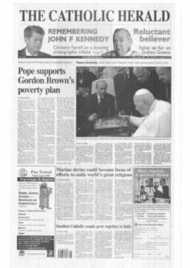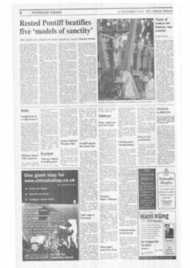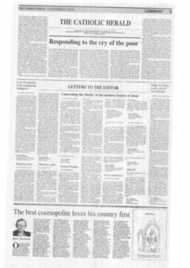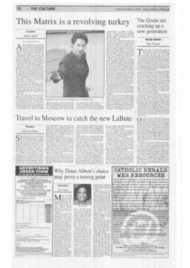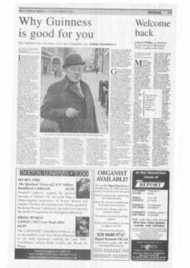Page 11, 14th November 2003
Page 11

Report an error
Noticed an error on this page?If you've noticed an error in this article please click here to report it.
Tags
Share
Related articles
Guild Toasts Guinness
By Richard Shaw
A Mea Culpa To Brideshead
Does We Share The Errors Of Islam And Protestantism?
The Conversion Of Alec Guinness
Why Guinness is good for you
Piers Paul Read was a fine choice as Sir Alec's biographer, says Anthony Symondson SJ Alec Guinness: The Authorised Life by Piers Paul Read, Simon & Schuster £20.
It was only when 1 read Piers Paul Read's biography of Sir Alec Guinness that I remembered that I had seen him more than once on stage. John Gielgud and Laurence Olivier are other great actors whose performances I had enjoyed, and 1 have never forgotten them. Guinness's post-war films are memorable because of the medium, their variety and frequent repeats. Why had I forgotten him in the theatre? The answer is that I recall the parts he played as freshly as if I had seen them yesterday, but not him as an actor.
Guinness had the power of immersing himself entirely in a role so that he lost his identity, which is why he was described as a man of many faces without one of his own. "The other theatrical knights," Read wrote in Guinness's lifetime, "may have outdone him in playing classical roles on stage, but none of them combines that mixture of kindliness, impudence and pathos which Sir Alec can put into a single smile ... His talent was to be convincing not as men as we imagine them to be but as men as they are — shy, uncertain and ambiguous." Or, as Gielgud once crushingly put it: "Why don't you stick to those funny little men you do so well?" Upon the whole, he did.
Guinness's widow, Merula, chose the novelist Read to be his biographer because he shared and understood their religion, they liked him, Guinness admired his work, and she did not want a conventional theatrical biography. Her choice was not misplaced. Guinness was a complicated, private, touchy, yet seriously religious, man. He had a painfully complex background that explains his human limitations arid genius, and a powerful personality that had a lasting effect Ott his friends.
His life demonstrates that a bad start did not destroy him but, while leaving scars, became a spur to achievement. Guinness was more fortunate than many in his position. Born out of wedlock in 1914 to an awful mother — silly, drunken, feckless, scrounging, unreliable — his presumed father, Andrew Geddes, a banker, gave him a modest private education, an allowance, and a little capital. She was Agnes Cuff, a barmaid, who, her son startlingly told John Le Carre, "slept with the entire crew on Lord Moyne's yacht at the Cowes Regatta and when she gave birth she called the bastard Guinness, but my father was probably the bloody cook". Maybe. Her refusal to identify him was a permanent source of bitterness. Instead, he had a bullying stepfather who mercifully emigrated to New Zealand. Guinness's later pleasure in a civilised life — good restaurants, hotels, books, pictures, smart company — is explained by his horrible beginning.
The Guinness surname impressed Gielgud (whom he idolised) and the stylish, cultivated actress, Martita Hunt. Guinness had approached Gielgud cold on the telephone, seeking him as an acting coach. He recommended Hunt and the name made her think that blue blood and stout coursed in his veins (some of the Guinness family later were eager to claim him as a cousin). What she discovered was an ill-fed, stage-struck young man with sticking-out ears and receding hair, who worked in an advertising agency. Reluctantly she accepted him, tried to terminate the arrangement, returned his money, but then recognised his talent, and gave him a further twelve sessions free. He lost a scholarship to RADA, but won another at the Fay Compton Studio of Dramatic Art, where he soon collected an award.
One of the judges was Gielgud, who thereafter took an interest in him. He was given the part of Osric in the legendary production of Hamlet in 1934. Cliched though it sounds, thereafter Guinness did not look back. He progressed from small parts to leading roles and quickly became noticed by the public and his theatrical colleagues.
The 1930s saw a renaissance in the English theatre that continued after the Second World War. There was not only Gielgud but the influence of foreign directors such as Michel St Denis, who founded the London Theatre School with George Devine and Glen Byam Shaw. Guinness enrolled, and there he met Meruld Salaman, a young actress of promise and solid, if bohemian, upper middle class background, whom despite her parents' reservations he married in 1938.
uinness belonged to a generation blighted by the war. He joined the navy, was promoted to lieutenant, found the sailors enchanting, and surprisingly contemplated taking holy orders in the Church of England. He and Merula had become AngloCatholics at a time when the movement was on the crest of a wave. This desire did not last, but their faith did, and gradually they came closer to the Catholic Church. They were received in 1956 and fitted like a glove at a time when English Catholicism was at the height of its confidence, intellectual and cultural influence, and numerical success. While both found the Church after Vatican II trying, they remained faithful. Catholicism occupied a central place in their lives, Farm Street hecame Guinness's spiritual home, and their religious path embodied the course of English Catholicism since the war.
Guinness had a complicated emotional life. He loved Merula and had a happy marriage; but he was sometimes an overbearing husband, and an unsympathetic father. Her attractiveness of character remained unchanged. Few in a polarised age now understand that some can feel drawn to their own sex without leading a life of furtive promiscuity or restless desire. Since his death in 2000, too much has been made of Guinness's homosexual inclinations, and Read unsensationally approaches the subject with perception and balance. Guinness was not "a bad man trying to be good", as some thought; but, like most of us, his perfection in grace was fought in the cockpit of the soul.
Read has written an outstanding biography of the man and the actor, based on his letters and diaries, as well as the recollections of his family and friends. It is as subtle, percipient, sympathetic and entertaining as it is honest.
If I were invited to nominate a book I had most enjoyed this year, I would choose this without hesitation.
blog comments powered by Disqus


